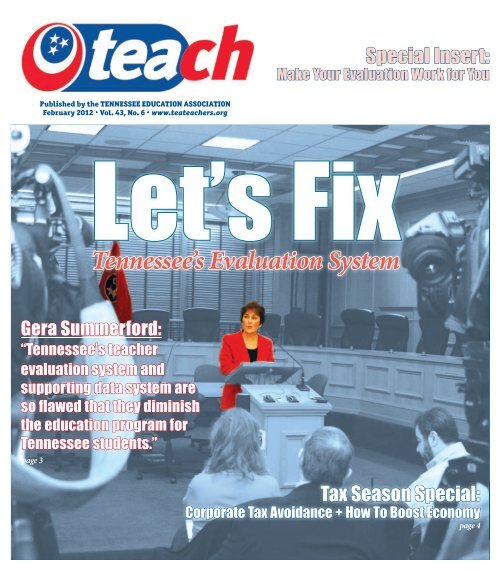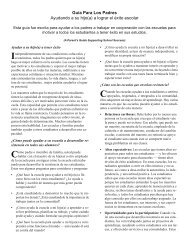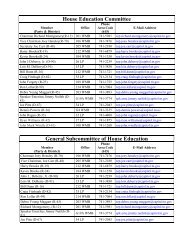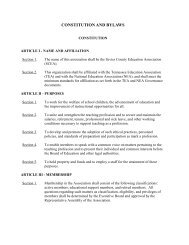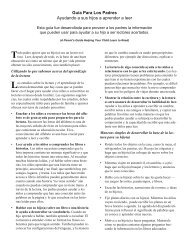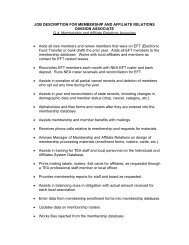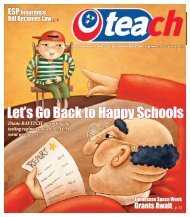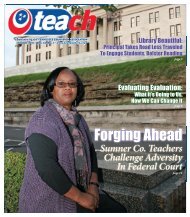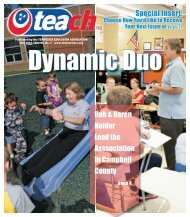February - Tennessee Education Association
February - Tennessee Education Association
February - Tennessee Education Association
Create successful ePaper yourself
Turn your PDF publications into a flip-book with our unique Google optimized e-Paper software.
Published by the TENNESSEE EDUCATION ASSOCIATION<br />
<strong>February</strong> 2012 Vol. 43, No. 6 www.teateachers.org<br />
Special Insert:<br />
Make Your Evaluation Work for You<br />
Let’s Fix<br />
<strong>Tennessee</strong>’s Evaluation System<br />
Gera Summerford:<br />
“<strong>Tennessee</strong>’s teacher<br />
evaluation system and<br />
supporting data system are<br />
so fl awed that they diminish<br />
the education program for<br />
<strong>Tennessee</strong> students.”<br />
page 3<br />
Tax Season Special:<br />
Corporate Tax Avoidance + How To Boost Economy<br />
page 4
Speaking out with you<br />
Gera Summerford, President<br />
Evaluation Not Suitable in Current Form<br />
One of the stated goals in the development of the new<br />
evaluation system was that it would provide timely feedback to<br />
teachers and help them improve instructional practice. I wish I<br />
could believe that is really happening in the majority of <strong>Tennessee</strong><br />
schools. Instead, the burdensome nature of the new system is<br />
too often interfering with educators’ ability to do what they<br />
know is best for their students. How can we<br />
re-focus the the original intent, consider what<br />
we’ve learned from educators in our schools,<br />
and modify the evaluation system so that it<br />
can effectively help teachers improve student<br />
achievement?<br />
In many cases the observation instrument<br />
is simply not suitable. Teachers tell me they<br />
spend hours of precious time preparing to<br />
teach the “perfect” lesson with no assurance<br />
that their students will be positively impacted. It’s not reasonable<br />
to expect that every teacher demonstrates every performance<br />
indicator every day in every lesson taught. We know that the<br />
number and kind of teaching methods we use must be appropriate<br />
to the students’ development, the grade and subject being<br />
taught, and the learning objectives for the day. TEA is proposing<br />
evaluation changes to assure that expectations are aligned with<br />
how students learn and how teachers teach.<br />
We also know that student growth and achievement data<br />
used in evaluations must be reliable and relevant. Teachers have<br />
reported numerous student data errors in the past and so far a<br />
process for correcting erroneous data has not been provided. And<br />
certainly it is not appropriate to base 35 percent of a teacher’s<br />
evaluation on the test scores of many students she doesn’t teach<br />
and in subjects she doesn’t teach. TEA is proposing the use of<br />
additional measures for student performance.<br />
Administrators report the many challenges they face<br />
with complex scheduling of observations and finding time<br />
for constructive feedback to teachers. They also struggle to<br />
balance evaluations with the multiple other duties of managing<br />
a school. TEA is proposing ways to lower the number of required<br />
observations for accomplished teachers to reduce this burden on<br />
principals.<br />
Educators in <strong>Tennessee</strong> welcome the opportunity to improve<br />
instructional practice and we seek the support of our employers<br />
in achieving that goal. When TEA supported the Race to the Top<br />
Application, the promise to teachers was that rigorous annual<br />
evaluations would be accompanied by streamlined, transparent<br />
and fair procedures. To date, that promise has not been kept.<br />
Since implementation of the new evaluation system began<br />
last fall, TEA has gathered feedback from educators through our<br />
Board of Directors, regional meetings throughout the state and<br />
carefully designed surveys. TEA members have expressed their<br />
concerns, and we know that now is the time to make necessary<br />
improvements to the system.<br />
For a full review of TEA’s proposed changes, please visit our<br />
website, www.teateachers.org.<br />
Al Mance, Executive Director<br />
Governor’s Class Size, Salary Proposals Hurt<br />
Two weeks ago Governor Haslam announced a two-pronged<br />
education proposal. It removes the current average class size limits<br />
while leaving maximums in place, proposing to “give local school<br />
systems flexibility” in the structuring of class loads.<br />
The ultimate impact: a K-3 school with an enrollment of 500<br />
students—which would have 25 classroom teachers under current<br />
law—will have only 20 teachers if the district<br />
decides to structure classes using the mandated<br />
maximums of 25 students. This change will have<br />
a very real effect on teaching and learning for<br />
every teacher and student in the larger classes.<br />
The most important things that happen<br />
in schools occur between students and their<br />
teachers. The more teacher time and attention<br />
each student gets, the more he or she is likely<br />
to learn. Research tells us that the results are<br />
particularly good when 17 or less students are<br />
assigned to a teacher.<br />
A well-educated, dedicated teacher in a classroom with a<br />
manageable number of students is the best guarantee good things<br />
will happen. This arrangement provides the greatest probability<br />
that students who are intellectual, artistic or scientific have the<br />
opportunity to develop to their full potential.<br />
The governor’s plan also repeals the minimum state salary<br />
schedule, requiring districts to submit salary plans—which may<br />
include bonuses or incentives to teach special subject areas or in<br />
certain schools—to the state each year. Increases in salaries will be<br />
funded by money saved from increasing class size or from local funds.<br />
The governor projects that the money saved by raising class size<br />
will result in enough money to raise the state’s contribution for each<br />
BEP teacher from $38,677.49 to $42,250. No additional money is being<br />
added to the classroom component of the BEP. It is just being shuffled<br />
from one pocket to another.<br />
All this is proposed after the state adopted the national Common<br />
Core Standards, raised state standards and launched new teacher and<br />
principal evaluation systems. Nothing in this proposal supports higher<br />
student performance.<br />
Rather, this is another step backward into administrative practices<br />
of the past. If the governor’s proposal becomes law, we’ll see more<br />
opportunities for biased treatment than in a generation. Class<br />
sizes will increase the workload of good teachers while the mental<br />
development of students will suffer.<br />
John Kenneth Galbraith considered educational and scientific<br />
disciplines to be “enlightenment,” which he saw as among the “larger<br />
goals of life.” Such goals are much less measurable than “that which<br />
associates all progress with… increases in Gross National Product<br />
or levels of unemployment.” He said the goals of the industrial<br />
system are so narrow that they lend themselves to precise statistical<br />
assessment. But life is meant to be complex.<br />
We have seen a metamorphosis of thought in American society<br />
since A Nation at Risk made headlines in 1983. Industrial interests<br />
have taken control of our political and education systems and are<br />
using them to transform American society into a society to serve<br />
their goals. We now have statistical approaches to measuring student<br />
progress, teacher effectiveness and the success or failure of public<br />
schools.<br />
TEA will be working hard to get these proposals changed to be<br />
responsive to the needs of students, teachers and schools. Join us.<br />
You count.<br />
teach (USPS 742-450, ISSN 15382907) is published<br />
monthly (except for June, July and December) by the<br />
<strong>Tennessee</strong> <strong>Education</strong> <strong>Association</strong>, 801 Second Avenue<br />
North, Nashville TN 37201-1099. Periodical postage<br />
paid at Nashville, TN. The subscription price of $3.65 is<br />
allocated from annual membership dues of $254.00 for<br />
active members; $127.00 for associate, education<br />
support and staff members; $16.00 for retired members;<br />
and $10.00 for student members. Member of<br />
State <strong>Education</strong> Editors Conference (SEE).<br />
Postmaster: Send address changes to teach,<br />
801 Second Avenue North,<br />
Nashville, TN 37201-1099.<br />
MANAGING EDITOR: Alexei Smirnov<br />
asmirnov@tea.nea.org<br />
PUBLISHER: Alphonso C. Mance<br />
MANAGER OF COMMUNICATIONS: A.L. Hayes<br />
<strong>Tennessee</strong> <strong>Education</strong> <strong>Association</strong><br />
801 Second Avenue North<br />
Nashville, TN 37201-1099<br />
Telephone: (615)242-8392,<br />
Toll Free: (800)342-8367, (800)342-8262<br />
Fax: (615)259-4581<br />
Website: www.teateachers.org<br />
BOARD OF DIRECTORS<br />
PRESIDENT: Gera Summerford* (800)342-8367<br />
VICE PRESIDENT: Barbara Gray* (901)353-8590<br />
SECRETARY-TREASURER: Alphonso C. Mance (615)242-8392<br />
DISTRICT 1 Leisa Lusk (423)928-6819<br />
DISTRICT 2 Melinda Reese (423)587-2120<br />
DISTRICT 3 Karen Starr (423)628-2701<br />
DISTRICT 4 Tanya Coats (865)637-7494<br />
DISTRICT 5 Sandy Smith (423)991-8856<br />
DISTRICT 6 Beth Brown* (931)779-8016<br />
DISTRICT 7 Bonnie T. Dixon (931)967-9949<br />
DISTRICT 8 Kawanda Braxton (615)554-6286<br />
DISTRICT 9 Erick Huth (615)973-5851<br />
DISTRICT 10 Guy Stanley (615)384-2983<br />
DISTRICT 11 Melanie Buchanan* (615)305-2214<br />
DISTRICT 12 Debbie D’Angelo (731)247-3152<br />
DISTRICT 13 Ernestine King (901)590-8188<br />
DISTRICT 14 Sarah Kennedy-Harper (901)416-4582<br />
DISTRICT 15 Stephanie Fitzgerald (901)872-4878<br />
ADMINISTRATOR EAST Johnny Henry (865)509-4829<br />
ADMINISTRATOR MIDDLE Margaret Thompson<br />
(615)643-7823<br />
ADMINISTRATOR WEST Charles Green (901)624-6186<br />
HIGHER EDUCATION Derek Frisby (615)898-5881<br />
BLACK CLASSROOM TEACHER EAST Paula Hancock<br />
(865)694-1691<br />
BLACK CLASSROOM TEACHER MIDDLE Alzenia Walls<br />
(615)230-8144<br />
BLACK CLASSROOM TEACHER WEST LaVerne Dickerson*<br />
(901)416-7122<br />
STATE SPECIAL SCHOOLS Vacancy<br />
ESP Christine Denton (931)647-8962<br />
TN NEA DIRECTOR Stephen Henry* (615)519-5691<br />
TN NEA DIRECTOR Diccie Smith (901)482-0627<br />
TN NEA DIRECTOR Diane Lillard (423)478-8827<br />
STEA MEMBER Caryce Gilmore (865)640-6590<br />
TN RETIRED Gerald Lillard (423)478-8827<br />
NEW TEACHER Candra Clariette (615)506-3493<br />
* Executive Committee<br />
<br />
<br />
<br />
<br />
<br />
<br />
<br />
<br />
<br />
<br />
<br />
<br />
<br />
Shortly after the new teacher and principal<br />
3. Provide that teachers who achieve an evaluation that rating forms be provided to teachers after each<br />
evaluation was rolled out in <strong>Tennessee</strong>, TEA members rating of “Meets Expectations” (a three on the five- observation.<br />
and staff began evaluating its implementation,<br />
point rating scale) shall be eligible for tenure.<br />
5. Expand the 15 percent options and allow<br />
documenting areas of concern that adversely<br />
4. Streamline and strengthen the observation teacher choice as contemplated in the law.<br />
affect teaching and learning. TEA released its<br />
process:<br />
6. Ensure accuracy of all data used in evaluations<br />
recommendations to correct the state’s flawed system * Reduce the number of required observations for by providing a process for correcting erroneous data.<br />
at a news conference in mid-January.<br />
accomplished teachers. For example, professionally<br />
7. Deliver teachers’ final evaluation ratings<br />
“<strong>Tennessee</strong>’s teacher evaluation system and<br />
licensed teachers with a rating of three or better (on a no later than the last work day of the school year.<br />
supporting data system are so flawed that they diminish five-point scale) would receive one observation each Ensure that evaluation ratings are accompanied by<br />
the education program for <strong>Tennessee</strong> students,” said year and a full evaluation cycle comprising multiple recommendations for improvement and indications of<br />
Gera Summerford, Sevier County high school math observations every five years.<br />
Pleaseshare<br />
the support to be provided to help teachers orpost improve.<br />
teacher and TEA president (pictured on the cover). “As<br />
a result, students suffer as teachers and administrators<br />
* Utilize observation instruments which<br />
appropriately reflect how students learn and teachers<br />
Pleaseshare<br />
orpost<br />
are distracted from focusing on student learning in teach across the range of teaching assignments.<br />
order to meet the demands of the evaluation system.” * Simplify and streamline the observation<br />
TEA’s list of recommendations includes:<br />
instrument so criteria to be observed in a single lesson<br />
1. Designate the 2011-2012 initial implementation are realistic in both number and scope.<br />
year as a pilot/practice year for the new evaluation<br />
system so that no educator will be negatively affected<br />
* Provide constructive feedback to teachers<br />
from one observation before the next one occurs.<br />
<strong>Education</strong>alSupportPersonnel<br />
TEA Building<br />
by this year’s evaluation rating.<br />
* Base evaluation ratings on actual observations<br />
Saturday, April 21, 2012<br />
<strong>Education</strong>alSupportPersonnel<br />
9:00 a.m. – 4:00 p.m.<br />
UniServ Staff contact information<br />
can be found on page 12.<br />
2 <strong>February</strong> 2012<br />
2. Prohibit the use of school-wide data as a<br />
substitute for individual growth data for non-TVAAS<br />
teachers. Rather, where TVAAS data does not exist,<br />
student growth shall be determined by appropriate<br />
criterion-referenced pre- and post-tests or comparable<br />
assessments.<br />
of teaching practice; prohibit manipulation of such<br />
ratings to fit a bell curve or expected student growth<br />
data.<br />
* Provide administrators and teachers with<br />
access to a scripting system so teachers can review<br />
and respond to observation data immediately. Require<br />
_____<br />
TEA Building<br />
Saturday, All ESPs April Invited 21, 2012<br />
9:00 TEA a.m. Building<br />
$15 Refundable – Registration 4:00 p.m. Fee<br />
_____<br />
Continental Breakfast and Lunch<br />
Saturday, All ESPs April Invited 21, 2012<br />
$15 Refundable CONFERENCESESSIONS:<br />
Registration Fee<br />
9:00 Continental a.m. Breakfast – and 4:00 Lunchp.m.<br />
NEWLAWS:SUMMARY&EXPLANATION&WHATCANTEADOFORME<br />
<br />
YOURRIGHTS:STATE&FEDERALLAW<br />
AConferenceFor<strong>Education</strong>alSupportProfessionals<br />
CONFERENCESESSIONS:<br />
MANAGINGMONEY&CREDIT All ESPs Invited<br />
NEWLAWS:SUMMARY&EXPLANATION&WHATCANTEADOFORME<br />
RETIREMENT<br />
<br />
YOURRIGHTS:STATE&FEDERALLAW<br />
SOCIALNETWORKINGDO’S&DON’TS<br />
$15 Refundable Registration Fee<br />
AConferenceFor<strong>Education</strong>alSupportProfessionals<br />
MANAGINGMONEY&CREDIT<br />
Continental Breakfast and Lunch<br />
RETIREMENT AConferenceFor<strong>Education</strong>al SupportProfessionals<br />
SOCIALNETWORKINGDO’S&DON’TS www.teateachers.org<br />
3<br />
TEA HEADQUARTERS STAFF<br />
EXECUTIVE DIRECTOR: Alphonso C. Mance; ASST. EXECUTIVE<br />
DIRECTOR, AFFILIATE SERVICES: Mitchell Johnson; ASST.<br />
EXECUTIVE DIRECTOR, PROGRAM SERVICES: Carol K.<br />
Schmoock; TEA GENERAL COUNSEL; Vacancy; MAN-<br />
AGER OF BUSINESS AFFAIRS: Stephanie Faulkner; IN-<br />
FORMATION TECHNOLOGY & SYSTEMS MANAGER, Galen<br />
Riggs; MANAGER OF UNISERV & BARGAINING CO-<br />
ORDINATOR: Donna Cotner; STAFF ATTORNEYS:<br />
Tina Rose Camba, Katherine Curlee, Virginia A.<br />
McCoy; MANAGER OF GOVERNMENT RELATIONS: Jerry Winters;<br />
GOVERNMENT RELATIONS ASSISTANT: Antoinette Lee; MANAGER<br />
OF COMMUNICATIONS & GRAPHICS: A.L. Hayes; WEB MASTER &<br />
COMMUNICATIONS ASSISTANT: Amanda Chaney; MANAGING EDI-<br />
TOR & COMMUNICATIONS ASSISTANT: Alexei Smirnov; MANAGER<br />
OF RESEARCH & INFORMATION: Melissa Brown; RESEARCH & IN-<br />
FORMATION ASSISTANTS: Susan Ogg; MANAGER FOR INSTRUCTION<br />
& PROFESSIONAL DEVELOPMENT: Terrance Gibson; INSTRUCTION<br />
& PROFESSIONAL DEVELOPMENT COORDINATORS: Susan Dalton,<br />
Nicki Fields; COORDINATOR OF MEMBERSHIP & AFFILIATE RELA-<br />
TIONS: Duran Williams.<br />
Governor’s Bill Puts Thousands of Jobs at Risk<br />
Larger classes threaten student learning<br />
<strong>Tennessee</strong>’s teachers see Governor Bill Haslam’s proposal to raise the<br />
average class size and repeal the minimum state salary schedule as adding<br />
insult to injury during an increasingly stressful school year.<br />
As TEA President Gera Summerford fielded calls from members concerned<br />
with the governor’s proposal, she pointed out that there will be no new money<br />
dedicated to teacher salaries—just a shifting of funds that could harm students<br />
and their teachers across the state.<br />
“After all the changes in the law that affected <strong>Tennessee</strong> curriculum<br />
standards and the<br />
evaluation of teachers<br />
and principals, the idea<br />
that the governor would<br />
increase class size and<br />
freeze teacher salaries is<br />
the last straw,” Summerford<br />
said. “Our concern is not<br />
with increasing class size<br />
in some schools by one or<br />
two students, but with the<br />
possibility of every class<br />
CurrentClassSizeLimits(TCA491104)<br />
<br />
GradeAverageMaximum<br />
levelperschoolperclass<br />
<br />
K32025<br />
462530<br />
7123035<br />
Vocational2025<br />
<br />
being maxed out at the state maximum level. We know that in school systems<br />
and county commissions which have experienced funding challenges, it is very<br />
likely that class sizes would be increased significantly under this proposal.”<br />
Contrary to decades-long research highlighting the positive impact of<br />
lower class size on student learning, the Haslam administration is pushing<br />
a bill in the state legislature that could increase class sizes in <strong>Tennessee</strong> by<br />
five students on average, making 25-30 students in elementary grades and 35<br />
students in high school the new norm.<br />
The state’s average class size grew by roughly five students per class since<br />
2000, according to state data.<br />
Filed in the State Senate as bill 2210 and bill 2348 in the House, the<br />
legislation suggests that the funds “saved” by increasing class size would then<br />
be shifted to the salary component of the Basic <strong>Education</strong> Program (BEP), the<br />
funding formula through which state education dollars are generated and<br />
distributed to <strong>Tennessee</strong> schools.<br />
While increasing the salary factor in the BEP from $37,000 to $42,250 would<br />
normally be a good thing, the governor proposes to eliminate the state salary<br />
schedule – the only assurance that teacher pay will increase based on years<br />
of service and advanced degrees, according to TEA research. Increasing the<br />
salaries of just a few teachers would put thousands of education jobs at risk.<br />
As a veteran high school math teacher, Summerford quickly saw the fallacy<br />
in the way the new bill is presented. “One of the arguments supporting this<br />
proposal is the way things are now, if all the classes meet the state average,<br />
with the enrollment of just one additional student the school would have to<br />
hire another teacher,” she said. “The fact is, no matter what the maximum is,<br />
no matter what standard is set for class size, at some point in every scenario<br />
you’ll reach the tipping point where you would have to hire someone, which<br />
invalidates the argument about changing the maximum class size number.”<br />
Armed with data from its research division, TEA strongly opposes the<br />
governor’s legislation. “Increasing class size will undoubtedly have a negative<br />
impact on student achievement,” said TEA Executive Director Al Mance, whose<br />
column on the opposite page also addresses the controversial proposal.<br />
“Eliminating the state minimum salary schedule writes a blank check to local<br />
school boards as to how state salary funds would be distributed.”<br />
TEA Unveils Seven-Point Plan to Fix Evaluation
Where Has All the Money Gone?<br />
By Melissa Brown<br />
As we prepare to file our taxes, comparing<br />
our effective tax rates with those of<br />
presidential candidates and high networth<br />
individuals, it’s quite easy to<br />
tune into the national conversation<br />
as corporate tax loopholes come<br />
under scrutiny. In discussions about the economy<br />
nationwide, we hear that the fiscal situation at home<br />
in <strong>Tennessee</strong> and with the federal budget are getting<br />
more dire. The growing income disparity further<br />
erodes the already shrinking middle class, pointing<br />
out the disproportionate burden being placed on<br />
working families. Meanwhile, corporations continue<br />
to exploit loopholes in the tax code and avoid shared<br />
responsibility. The analysis below is an attempt to<br />
answer the question: What is the impact of corporate<br />
tax loopholes?<br />
Lost State Revenue<br />
A December 2011 study by the Citizens for Tax Justice<br />
and the Institute on Taxation and Economic Policy<br />
reported on the state and local income tax payments of<br />
265 profitable Fortune 500 companies.<br />
The report focused on 265 Fortune 500 companies<br />
that fully disclosed their tax payments, finding the<br />
following:<br />
• 68 companies paid no state income tax at all in<br />
at least one year from 2008 through 2010 and 16 of these<br />
companies had multiple no-tax years.<br />
• In 2009, 32 companies paid no state income tax.<br />
• The corporations were able to avoid a total of<br />
$42.7 billion in state corporate income taxes from 2008<br />
through 2010. U.S. profits totaling $1.33 trillion were<br />
reported to shareholders. Paying the 6.2 percent average<br />
state corporate tax rate, the corporations would have<br />
paid $82.6 billion in state corporate income taxes over<br />
the 2008-10 period. Instead, they paid only $39.9 billion.<br />
The companies used in the study operate throughout<br />
the United States. However, these companies do not<br />
disclose profits and taxes on a state-by-state basis, so<br />
the findings do not show conclusively whether specific<br />
companies paid any income tax in specific states.<br />
The Nelson A. Rockefeller Institute of Government<br />
reports that corporate income taxes make up only 5.7<br />
percent of state revenues, which is down from 9.7 percent<br />
in 1980.<br />
Lost Federal Revenue<br />
A November 2011 report by the National <strong>Education</strong><br />
<strong>Association</strong> noted that $222.7 billion of federal revenue<br />
was lost for years 2008 through 2010 due to corporate<br />
tax avoidance. A total of $9.8 billion could have gone to<br />
public schools and colleges nationwide.<br />
How did this affect education funding in <strong>Tennessee</strong>?<br />
The scenarios below describe how the lost revenues could<br />
have been used to improve our society and potentially<br />
boost the economy.<br />
Lost Federal Dollars for <strong>Education</strong> and Other Aid<br />
• $200 million in lost federal dollars for education<br />
• Dollars would have supported 2,859 education jobs<br />
• $1,500 lost federal dollars for Other Grants to State<br />
and Localities.<br />
Lost Federal Dollars for Title I Grants<br />
• Would have provided $180 million in grant dollars<br />
that would have benefited 205,296 students in poverty<br />
• Average funding lost per student in poverty: $878.<br />
Lost Federal Dollars for Special <strong>Education</strong><br />
• $200 million in lost grant dollars that would have<br />
benefited 119,455 students with disabilities.<br />
Lost Federal Dollars for Pell Grants<br />
• $191 million that would have benefited 148,462<br />
students in need<br />
• Average dollars lost per student in need: $1,286.<br />
Lost Federal Dollars for Head Start<br />
• $170 million in grant dollars that would have<br />
benefited 8,060 additional children in poverty who would<br />
have been enrolled in a Head Start program.<br />
Clearly, the amount of lost state and federal revenues<br />
due to corporate tax avoidance is significant.<br />
The amount of lost federal dollars alone could<br />
have funded or expanded programs for <strong>Tennessee</strong>’s<br />
children, expanded existing services and provided<br />
education positions for some of <strong>Tennessee</strong>’s 9.1 percent<br />
unemployed, based on the <strong>Tennessee</strong> Department of<br />
Labor and Workforce Development November 2011<br />
unemployment rate. At a time when the state continues<br />
its efforts to rebound from the Great Recession, budget<br />
revenues lost through corporate tax avoidance would not<br />
have been a luxury. According to experts who worked on<br />
many taxation studies, a fair tax burden is a necessity<br />
in funding education more appropriately, providing jobs<br />
and lessening the tax burden on the average working<br />
family.<br />
Melissa Brown is TEA manager of research.<br />
Stockpiled, Snow Days<br />
Rules Unchanged This Year<br />
Are school systems still allowed to use<br />
stockpiled days for snow days? TEA received a<br />
number of inquiries from teachers as to whether<br />
the State Department of <strong>Education</strong> has changed<br />
its policy on the use of stockpiled days for<br />
snow days. The Commissioner of <strong>Education</strong> has<br />
released the following statement in response to<br />
these inquiries:<br />
“State law allows school systems to stockpile<br />
up to 13 days by increasing the school day up to<br />
30 minutes and to use this excess time to make<br />
up for instruction missed due to dangerous or<br />
extreme weather conditions, such as snow. No<br />
approval is required from the commissioner<br />
provided the excess time is used for this purpose.<br />
Any school system that has adopted a school<br />
calendar with stockpiled days will be able to use<br />
that excess time for snow as it has in the past.<br />
“State law requires the approval of the<br />
commissioner if:<br />
1. A school system is using stockpiled<br />
days for other limited purposes outlined in the<br />
law—natural disasters, serious outbreaks of<br />
illness or dangerous structural or environmental<br />
conditions rendering a school unsafe for use; or<br />
2. Outright waiver of the 180-day<br />
instructional requirement in the event of a<br />
natural disaster or serious outbreak of illness.<br />
“For example, if a school system chose not<br />
to stockpile but then faced an illness outbreak<br />
where students missed a large number of days of<br />
instruction, it could apply to the commissioner<br />
for a waiver of the 180 day requirement.”<br />
Neither state law nor the State Department<br />
of <strong>Education</strong> has changed any law or policy<br />
regarding the use of stockpiled days for snow.<br />
Get Empowered, Connect<br />
At Minority Affairs Conference<br />
Mark your calendar and make plans to attend<br />
the Johnella Martin/TEA Statewide Minority<br />
Affairs Conference on March 23-24 at the<br />
DoubleTree Hotel in Chattanooga.<br />
Titled “Empowering and Connecting<br />
Educators to Meet Challenges, Today and<br />
Tomorrow,” the conference promises an exciting<br />
lineup of speakers and workshops. Registration<br />
deadline is March 12.<br />
Panelists Mary Mancini, <strong>Tennessee</strong> Sen. Jim Kyle, Sen. Andy Berke and Rep. Joe Pitts.<br />
How to Fix Our Economy<br />
Experts suggest strategies, question<br />
state use of incentives to business<br />
It may not be obvious when one enters the state<br />
legislature these days, but <strong>Tennessee</strong> has viable<br />
options as it tries to get its fiscal house in order.<br />
“Right here in the state legislature, when a bill<br />
is introduced, it seems the first question that gets<br />
asked is whether it’s good for business. The fair<br />
approach is to ask whether it’s good for the people<br />
of <strong>Tennessee</strong>,” said Mary Mancini of the <strong>Tennessee</strong><br />
Citizen Action organization during the Jobs and<br />
the Economy Summit held at the end of last year in<br />
Nashville.<br />
Panelists and attendees agreed that education<br />
funding is the foundation of economic prosperity in<br />
<strong>Tennessee</strong>.<br />
“<strong>Education</strong> is a primary economic driver for<br />
the state and its localities,” said Matthew Murray,<br />
professor at the University of <strong>Tennessee</strong> Center<br />
for Business and Economic Research. “<strong>Education</strong><br />
also creates important spillover benefits, such as<br />
increased longevity, lower infant mortality rates,<br />
more volunteerism and higher voting rates.”<br />
But current trends suggest that the focus in<br />
<strong>Tennessee</strong> has been elsewhere. With <strong>Tennessee</strong>’s<br />
unemployment rate hovering above the national<br />
average at 9.6 percent, and per-capita income<br />
growth of only 60 cents a year during the last 10<br />
years (in inflation-adjusted figures), it is clear that<br />
the economic engine needs adjusting. The gap<br />
between the poorest and wealthiest Tennesseans<br />
keeps growing wider. In fact, the state now ranks<br />
fifth in the nation in terms of wealth disparity,<br />
according to Michael Kahn, associate director of<br />
finance and economics at NEA.<br />
“Currently in <strong>Tennessee</strong>, tax structures are<br />
out of sync with the economy, and school funding<br />
is inadequate and inequitable. Schools lack the<br />
capacity to do their jobs, but teachers are being<br />
held accountable for student outcomes,” said Kahn.<br />
“These trends undermine our future economic<br />
prosperity.”<br />
To solve the state’s fiscal problems, Kahn<br />
suggested ensuring adequate and equitable<br />
funding for public education through a system of<br />
revenues that involves a level playing field for all<br />
businesses, large and small. “Above all, if we want<br />
to keep our economic edge in the knowledge-based<br />
global economy, we must make investment in public<br />
education our top priority,” he said.<br />
To the obvious argument that there is no<br />
money, Kahn questioned <strong>Tennessee</strong>’s current use of<br />
the so-called economic development subsidies to<br />
corporations. When the state of <strong>Tennessee</strong> offered<br />
$577 million in subsidies to lure the Volkswagen<br />
plant to Hamilton County, Kahn said the lost<br />
revenue could have been spent more wisely. Under<br />
the VW agreement, the city of Chattanooga and<br />
Hamilton Co. will forego $200 million in property<br />
tax collections for 30 years, and that’s just one<br />
example of the myriad subsidies being doled out by<br />
state and local officials to businesses every year.<br />
At the same time, education funding in <strong>Tennessee</strong><br />
is now less than it was in 1970, and teacher salaries<br />
remain largely unchanged over the last 20 years,<br />
said Kahn.<br />
Adding another item to the economic<br />
prosperity wish list, Murray questioned the lack of<br />
transparency in tax increment financing currently<br />
used by localities for new economic development.<br />
“TIF financing likely does more to reallocate<br />
economic activity than create new activity,” he<br />
said. “TIFs may also divert funds from schools to<br />
financing of new development.”<br />
While offering a solution, Kahn invoked the<br />
name of billionaire investor Warren Buffett, the<br />
champion of fair taxation among the wealthy.<br />
“Just imagine the top one percent of income<br />
earners in <strong>Tennessee</strong> with an annual income of<br />
about $1.3 million paying at the same effective<br />
rate as the bottom 20 percent,” he said. “It would<br />
generate $2.2 billion—enough to wipe out the<br />
adequacy gap and fix the structural deficit.”<br />
Such measures may cause pro-business hawks<br />
to cry foul, but Kahn insisted that they won’t hurt<br />
small business because, according to IRS data, only<br />
2 percent of small business owners make more than<br />
$250,000 a year.<br />
“As China doubles its investment in education,<br />
no politician should be able to get away with saying<br />
that they care about our state’s and country’s<br />
future while shortchanging education,” said Jerry<br />
Winters, TEA manager of government relations,<br />
who attended the conference.<br />
More than 96% of<br />
TEA Dues Qualifies<br />
For IRS Tax Deduction<br />
The portion of TEA dues expended<br />
for government relations activities for<br />
2010/2011 is 3.82 percent.<br />
TEA members can deduct 96.18 percent<br />
of their dues for IRS income tax purposes.<br />
TEA provides a pass-through procedure<br />
whereby members contribute to TEA-FCPE<br />
(<strong>Tennessee</strong> <strong>Education</strong> <strong>Association</strong> Fund for<br />
Children and Public <strong>Education</strong>).<br />
The amount of TEA-FCPE pass-through<br />
for the current year is $4.41 per active<br />
member and $2.21 per ESP staff member.<br />
Members who do not desire to<br />
participate may divert these funds to other<br />
government relations activities — such as<br />
promotion of the TEA legislative program<br />
and lobbying — by completing and mailing<br />
the accompanying form, postmarked no<br />
later than April 10, 2012.<br />
I request that the portion of my dues eligible<br />
to be passed through to TEA-FCPE be used in<br />
other TEA Government Relations activities.<br />
Name (please print)<br />
4 <strong>February</strong> 2012 For details, visit www.teateachers.org.<br />
5<br />
Address<br />
City State ZIP<br />
Social Security Number<br />
Active Member<br />
School System<br />
Signature<br />
<strong>Education</strong> Support Professional<br />
Student Member<br />
Mail to: <strong>Tennessee</strong> <strong>Education</strong> <strong>Association</strong>,<br />
801 Second Avenue North, Nashville, TN<br />
37201-1099. (This form must be postmarked or<br />
received no later than April 10, 2012.)<br />
www.teateachers.org
March 2012<br />
sun mon tues<br />
wed thurs fri sat<br />
1<br />
NEA’S Read<br />
Across<br />
America Day<br />
2 3<br />
4 5 6 7 8 9 10<br />
11 12 13 14 15 16 17<br />
18 19 20 21 22 23 2<br />
24<br />
25<br />
26 27 28 29 30<br />
31<br />
WOMEN’S HISTORY MONTH<br />
NEA’S Read Across America<br />
Building a Nation of Readers<br />
Tip ip of f the th the Month MMonth th<br />
How will you help the Lorax spread his<br />
message? How about planting a reading garden<br />
or creating a pledge tree? You’ll fi nd these ideas<br />
and more at www.seussville.com.<br />
Link of the Month<br />
Stay connected to NEA’s Read Across America<br />
through our website and Facebook page. Go<br />
to www.readacrossamerica.org to pledge and<br />
www.nea.org/readacross to download materials.<br />
Activity of the Month<br />
Proud of your Read Across America activities?<br />
Post and tweet your favorite photos, upload your<br />
videos to Schooltube and Youtube, and blog<br />
about ab b your favorite books. Sharing your stories<br />
will w inspire others to do the same.<br />
MARCH M DATES<br />
March 2 NEA’s Read Across America Day<br />
March 5 Teen Tech Week begins<br />
March 14 Pi Day<br />
March 17 St. Patrick’s Day<br />
www.nea.org/readacross<br />
w<br />
dacross<br />
6 <strong>February</strong> 2012 7<br />
Teen Tech<br />
Week begins<br />
Pi Day<br />
St. Patrick’s<br />
Day<br />
www.nea.org/readacross<br />
The<br />
Lorax, written and<br />
illustrated ill t t d by b Dr. D Seuss, S moves<br />
from page to screen nationwide<br />
on Read Across America Day.<br />
Here’s your chance to share your<br />
love of the book and fi lm.<br />
Published in1971 in 1971 by RandomHouseChildren’s Random House Children Children’s s Books Books.<br />
www.seussville.com. Artwork used with permission.<br />
Create a Dr. Seuss<br />
Reading Event<br />
The following is a simple<br />
scenario for elementary or<br />
middle school teachers who<br />
want to conduct a Read Across<br />
America event in their classroom.<br />
This is by far the most typical<br />
celebration and can be easily<br />
adapted to other situations.<br />
Consult your principal<br />
and obtain approvals. Most<br />
principals love Read Across<br />
America and are happy to get<br />
involved.<br />
Look at your school’s calendar<br />
and choose a date to celebrate.<br />
The official day is March 2. If this<br />
conflicts with another event,<br />
feel free to pick a different day.<br />
Some schools celebrate the<br />
week before or after. Talk to your<br />
principal and check your school<br />
calendar as early as possible to<br />
avoid any last-minute problems.<br />
Read the copyright and<br />
licensing arrangements. It’s<br />
important to honor NEA’s<br />
agreements with Dr. Seuss<br />
Enterprises in order to maintain<br />
this special relationship.<br />
Consult with your school<br />
librarian. It’s likely that he or<br />
she is already familiar with Read<br />
Across America and may have<br />
ideas to offer. Reserve books in<br />
advance—there may be a run on<br />
Dr. Seuss titles!<br />
Ask other teachers if they<br />
are making plans. Consider<br />
coordinating your efforts for a<br />
school-wide event.<br />
Invite guest readers to<br />
come to your class on March<br />
2 and read to your students.<br />
There is something powerful<br />
about a policeman, firefighter,<br />
mayor, radio personality, pastor,<br />
high school quarterback, or<br />
grandmother sharing their love<br />
for reading.<br />
Be sure to ask your guests<br />
to talk about why reading is<br />
important in their lives, and<br />
about their favorite books when<br />
they were kids. Afterwards,<br />
encourage your students to write<br />
thank-you notes.<br />
Make arrangements for a Dr.<br />
Seuss birthday cake if resources<br />
allow.<br />
Visit www.nea.org/<br />
readacross for more ideas.<br />
www.teateachers.org
NEA Representative Assembly 2012 Delegate Nominees<br />
TEA Members Run for NEA RA State Delegate Positions<br />
Delegates announce nominations for NEA’s<br />
highest decision-making body<br />
Biographical information and photographs submitted by candidates for state<br />
delegate positions to the National <strong>Education</strong> <strong>Association</strong>’s Representative Assembly<br />
in Washington, DC, June 30-July 5, 2012, are published in this four-page section.<br />
All properly qualified candidates will be listed on ballots which local association<br />
presidents will receive by March 1.<br />
For Category 1, NEA members will vote for two district delegates based on the<br />
district in which they teach. Category 1 includes candidates who are classroom<br />
teachers, education support professionals or persons who serve in other nonsupervisory<br />
positions.<br />
In Category 2, NEA members may vote for any three of the candidates. This<br />
category includes members who are supervisors, administrators or retired NEA life<br />
members. Information about clustering for supervisors/administrators and small local<br />
associations was printed in the November 2011 issue of teach.<br />
Any NEA-retired life, education support or active member not affiliated with a<br />
CATEGORY I<br />
District 1<br />
Leisa Lusk — Special<br />
<strong>Education</strong> teacher at David<br />
Crockett High School in<br />
Washington Co. Building<br />
Rep. for Washington Co. EA.<br />
Former WCEA vice president<br />
and president. Member of<br />
WCEA bargaining team.<br />
Chief spokesperson for WCEA<br />
bargaining team, grievance<br />
team committee chair, representative at TEA and<br />
NEA assemblies, current and past member of the<br />
TEA board of directors, legislative contact team<br />
member. Previously taught in Sevier Co.<br />
Anna Booher — Currently<br />
TEA FUND Council member<br />
and Membership Committee;<br />
served 1 term on TEA Board;<br />
3 time Bristol EA president;<br />
TEA Distinguished Educator;<br />
2 time Rotary Teacher of the<br />
Year; attended 13 NEA RAs;<br />
has served on 8 different TEA<br />
committees numerous times<br />
over 37 years; locally, is involved in numerous association<br />
activities, including FUND chairperson<br />
and Executive Committee; high school teacher in<br />
the Bristol City school district; holds graduate<br />
degree; Career Ladder III; ADK; DKG.<br />
District 2<br />
Gera Summerford — Math<br />
teacher from Gatlinburg-<br />
Pittman High School and has<br />
taught in Sevier County since<br />
1982; earned B.A. in mathematics<br />
and German from<br />
Baylor University, master’s<br />
degree in mathematics from<br />
the University of <strong>Tennessee</strong>,<br />
Ed.S. degree from Lincoln<br />
Memorial University; former chief negotiator for<br />
Sevier County <strong>Education</strong> <strong>Association</strong>; numerous<br />
other local leadership positions. TEA Board of<br />
Directors 2003-2006, TEA Vice-President 2006-<br />
2010, was elected TEA President in June 2010.<br />
Melinda S. Reese — Currently<br />
presiding on the TEA Board of<br />
Directors for District 2 and<br />
as HCEA’s President;<br />
HCEA’s Negotiations Chief<br />
Spokesperson; Active member<br />
of HCEA’s Executive Board;<br />
Served on the following HCEA<br />
committees: Negotiations,<br />
Membership, HCPACE,<br />
Legislative, & Newsletter; Chairperson of TEA‘s<br />
2009-2010 Professional Negotiations‘ Committee<br />
and participant of many TEA-sponsored events,<br />
such as Summer Leadership School, Bargaining<br />
Conferences, Area Cluster Meetings, TUEAC,<br />
Spring Symposium, Legislation/Lobbying days,<br />
local delegate to TEA RAs, & various workshops.<br />
Jackie Duncan *<br />
District 3<br />
Karen Starr — Morgan<br />
Co. native, received her<br />
bachelor of science degree<br />
in elementary education,<br />
grades 1-8, from <strong>Tennessee</strong><br />
Technological University.<br />
She has earned a master’s<br />
degree and Ed.S. degree in<br />
curriculum and instruction<br />
from <strong>Tennessee</strong> Technological<br />
University. An active member since she began<br />
teaching in 1991, Karen has served several years<br />
as her building representative and attended<br />
numerous TEA conferences to represent her local<br />
association.<br />
Donna Jerden — Educator for 25 years and<br />
currently the librarian at Central Middle School<br />
in Wartburg, with 21 years of experience in the<br />
classroom and 4 years on TEA staff. Spent 11 years<br />
as a classroom teacher and ten years as a librarian.<br />
BS, MA, and Ed.S. from TTU with certification<br />
local association who wishes to vote in the election may receive a ballot by writing or<br />
calling TEA, 801 Second Avenue North, Nashville, TN 37201-1099, (615) 242-8392 or<br />
(800) 342-8367.<br />
The National <strong>Education</strong> <strong>Association</strong> Representative Assembly (RA) is NEA’s<br />
highest decision-making body. With over 9,000 delegates, it is also the world’s largest<br />
democratic, deliberative body.<br />
The RA is convened every July during the Annual Meeting. While the first two days<br />
are devoted to discussions, conferences, and exhibits, the highlight is the Representative<br />
Assembly itself. During this important event, delegates debate issues that impact<br />
American public education, elect NEA officers, and set policy for the 3.2 million-member<br />
<strong>Association</strong>.<br />
In conjunction with the Annual Meeting, NEA also hosts several pre-RA events,<br />
including the Joint Conference on the Concerns of Minorities and Women. The annual<br />
two-day event attracts more than 1,000 active and retired teachers, education support<br />
professionals (ESP) and higher education employees. Participants explore societal<br />
trends, the latest education research, current reform, best practices, and other critical<br />
issues affecting students and employees. We invite you to come and lend your voice to<br />
the conversation.<br />
Margaret Morgan *<br />
District 4<br />
in Elementary, Library, and<br />
Beginning Administrator.<br />
“I have always enjoyed<br />
storytelling and politics,<br />
but I’m most adamant about<br />
children and their access to<br />
quality public education.”<br />
Tanya Coats — Instructional<br />
Coach (CIF); Green Magnet<br />
Math & Science Academy;<br />
KCEA treasurer, KCEA<br />
Executive Board Member,<br />
Member of TEA Board of<br />
Directors for East <strong>Tennessee</strong>;<br />
KCEA committee member<br />
of the following: Minority<br />
Affairs, Public Relations,<br />
Elections, Human Resource; Green Magnet’s SWS<br />
Leadership Team, Coaches Network. Serves as one<br />
of TEA Minority Affairs chairs. “As a former chair of<br />
TEA’s Administrative Task Force Committee, I have<br />
learned that representing everyone is important.”<br />
Paula Hancock — 8th Grade<br />
Mathematics Teacher, Vine<br />
Middle Magnet School;<br />
TEA Board of Directors,<br />
East <strong>Tennessee</strong> Black<br />
Classroom Teacher; KCEA<br />
<strong>Association</strong> Representative;<br />
KCEA Minority Affairs<br />
Committee; TEA Resolutions<br />
Committee; TEA Representative Assembly; NEA<br />
Representative Assembly.<br />
Anthony Hancock — Special <strong>Education</strong> Teacher;<br />
Comprehensive Development Classroom (CDC),<br />
Bearden Middle School. Knox County EA: Minority<br />
Affairs Leadership Committee, <strong>Association</strong><br />
Representative. TEA: State Resolutions member,<br />
Southeast Regional Minority Leadership Training<br />
Committee, Minority Affairs<br />
Leadership committee, New<br />
Teachers Training Committee,<br />
State Delegate – RA Assembly.<br />
NEA: NEA Resolutions<br />
Committee.<br />
Karen Peterman — Knox<br />
County classroom teacher<br />
with 28 years of experience.<br />
BS, BA, MS (+45 hrs). KCEA<br />
Executive Board, 2005 TEA<br />
Distinguished Classroom<br />
Teacher. Former local<br />
president, vice president,<br />
secretary, treasurer,<br />
newsletter editor, chief<br />
negotiator and TUEAC<br />
president. Served on TEA’s<br />
IPD Commission, Resolutions, Status of Women,<br />
and NEA Concerns Committees 17 TEA & 15 NEA<br />
Representative Assemblies. “I hope that you<br />
will allow me to represent you at this important<br />
national meeting.”<br />
Joan Washington —<br />
Solutions’ Teacher, Beaumont<br />
Elementary, Knox County: 24<br />
years experience. Member:<br />
KCEA Executive Board, KCEA<br />
Minority Affairs, TEA, NEA.<br />
Candidate for Distinguished<br />
Teacher Award. Committees:<br />
Teacher Evaluation Advisory<br />
and TUEAC. Served on Mentoring Team for Knox<br />
County, Project Grad Cooperative Management<br />
Consistency Discipline Coach for several years,<br />
Chair of <strong>Education</strong> Advancement Fund, Alpha<br />
Kappa Alpha Sorority. Children of God Ministries’<br />
Secretary. “I would like to serve as your 2012 NEA<br />
RA State Delegate.”<br />
District 5<br />
Diane Lillard — Kindergarten teacher at<br />
Waterville Elementary. She is a graduate of<br />
Lee University with a B. S. in Early Childhood<br />
Elementary <strong>Education</strong> and 29 years experience.<br />
She is currently serving on the NEA Board of<br />
Directors. Local association<br />
experience: Bradley County<br />
EA president, treasurer,<br />
executive board, chief<br />
negotiator, membership<br />
chair, newsletter editor,<br />
communications chair, PR&R<br />
chair, AEW coordinator,<br />
Research chair, Read Across<br />
America coordinator.<br />
State Experience: TEA ION, Communications,<br />
Membership, Member Benefits, IPD Commission,<br />
Insurance, Professional Negotiations.<br />
Sandy Smith — With Hamilton<br />
County since 1987. B.S.<br />
degree from the University of<br />
Chattanooga and a M.Ed. from<br />
UTC. Completed graduate<br />
work through Project<br />
Re-ed at the University of<br />
<strong>Tennessee</strong>. Currently serves<br />
as H-PACE chair (4), HCEA<br />
Board of Directors (3), TEA<br />
State Special Schools Committee(2). Previous<br />
activities include TEA IPD Commission (3), HCEA<br />
IPD Chair (3), Chair of Legislative Branch (3),HCEA<br />
Legislative Committee (3), TEA/HCEA Legislative<br />
Contact (1), Grassroots Cadre (3), KEYS facilitator,<br />
Superintendent’s Advisory Council (6).<br />
Sandra C. Griffin — More than 30 years in education,<br />
middle school reading teacher. Personal<br />
motto: “Don’t let anyone extinguish your flame<br />
for achieving greatness.” B.S. Clark-Atlanta<br />
University; M.Ed. Trevecca University; Doctor of<br />
Bible Ministry, Covington Theological Seminary.<br />
Member of TEA-NEA, HCEA Board of Directors,<br />
district negotiation team, H-Pace, TEA-Legislative<br />
Contact, Delta Sigma Theta Sorority, Phi<br />
Delta Kappa Sorority, Daughters of Isis, PHA,<br />
Member of Warren Chapel AMEC. Married to Rev.<br />
A.C. Griffin, Jr. Mother of Tanacha L. Griffin and<br />
A.C. Griffin III.<br />
Deborah Taylor — Algebra I<br />
educator at East Ridge High<br />
School, more than 25 years<br />
in Hamilton County schools;<br />
TEA committees—Status of<br />
Women and Minority Affairs;<br />
TEA/NEA Representative<br />
Assemblies; served as HCEA<br />
AR and alternate. <strong>Tennessee</strong><br />
State University (B.S.), Trevecca (M.Ed.), Delta<br />
Sigma Theta Sorority, Phi Delta Kappa Sorority,<br />
DOI, PHA. “Serving as your 2012 NEA Delegate at<br />
the RA would be an honor.”<br />
Michael Plumley — Media<br />
Specialist at Waterville<br />
Community Elementary<br />
School in Bradley County. I<br />
have been a member of the<br />
<strong>Association</strong> for all of my<br />
professional career of 35<br />
years. I have served my local<br />
in several areas of leadership<br />
including AR, secretary,<br />
treasurer, president-elect, member of the<br />
executive board, negotiations team, membership<br />
chair. I have served TEA on many state<br />
committees including Professional Negotiations,<br />
Communications, Member Benefits, ESP, IPD<br />
Commission, TEA Resolutions, and currently on<br />
ION Committee.<br />
Bryan Massengale — Band<br />
director at Rhea Central<br />
Elementary School, Rhea<br />
County since 1984. “I live<br />
on the farm where my father<br />
was born in 1923.” B.S.<br />
degree in music education,<br />
University of <strong>Tennessee</strong>,<br />
Knoxville, 1980; M.S. degree<br />
in Administration & Supervision, UT-Knoxville,<br />
1993; Ed. S. in <strong>Education</strong>al Leadership, <strong>Tennessee</strong><br />
Tech University. Rhea-Dayton EA president, past<br />
president, newsletter editor, chief negotiator;<br />
NEA: past NEA Today local editor advisory board;<br />
attended 12 previous NEA Representative<br />
Assemblies.<br />
8 <strong>February</strong> 2012 9<br />
District 6<br />
Beth Brown *<br />
Tommy Scott Price — Math<br />
teacher at Coffee County<br />
Central High School since<br />
1996. Current and past<br />
President of the Coffee Co.<br />
EA. Served as local delegate<br />
to TEA/TEA RA for several<br />
years. Recently appointed<br />
chairman of the PECCA Special<br />
Question Committee for Coffee County Schools.<br />
B.A. in secondary education mathematics, 1993.<br />
M.Ed., MTSU, 2007. Taught at Hamilton Co. Schools<br />
between 1993 and 1995.<br />
District 7<br />
Bonnie Dixon *<br />
Derek Frisby *<br />
Barbara Fisher — Lebanon<br />
Special School District, 31<br />
years; B.A. education, M.A.<br />
administration/supervision,<br />
+45, TSU; Lebanon EA<br />
Executive Board advisory;<br />
TEA Executive Board; past<br />
Status of Women chair; TEA<br />
RA 23 years; NEA RA 18 years;<br />
Retired Teachers Legislative<br />
Committee; Minority Affairs advisory; Phi Delta<br />
Kappa Executive Board; Delta Sigma Theta; Kappa<br />
Omicron Phi; “I will continue to represent the<br />
vision, ideals and commitment of the NEA.”<br />
District 8<br />
Kawanda Braxton *<br />
District 9<br />
Candra Clariette *<br />
Stephen Henry — MNEA:<br />
President, Vice-President,<br />
Treasurer, Parliamentarian,<br />
Board-District Director,<br />
Executive Committee, Chief<br />
Negotiator; Committee Chair-<br />
Budget & Finance, Public<br />
Relations, Bylaws, Human<br />
Relations; PACE Council,<br />
Martin Human Relations Award, TEA: Board of<br />
Directors, TEA-FCPE Council, Committees-NEA<br />
Concerns, Executive, Negotiations, Credentials,<br />
Human Relations, Communications, Chair-ION &<br />
Human Relations; “I Can Do It” Trainer, Johnson<br />
Human Relations Award, TUEAC, NEA: Board<br />
of Directors & Executive Committee-Official<br />
Observer, Committees-SOGI, Equity & Ethnic<br />
Harmony; NEA-FCPE Council, HCR Division-<br />
National Trainer, NCUEA, 2011 <strong>Education</strong><br />
International World Congress Delegate.<br />
Erick Huth — Vice president<br />
of the Metropolitan Nashville<br />
<strong>Education</strong> <strong>Association</strong>,<br />
which he represents on<br />
the TEA Board of Directors.<br />
He also serves as trustee<br />
and executive committee<br />
member of the <strong>Tennessee</strong><br />
Consolidated Retirement<br />
System, a trustee on the Metro Teacher Retirement<br />
System, the Metropolitan Professional Employee<br />
Insurance Trust and Sick Leave Bank. Formerly:<br />
NCUEA Parliamentarian and Regional Director,<br />
MNEA chief bargaining spokesperson, Bylaws,<br />
PR, Building Chair for MNEA; president <strong>Tennessee</strong><br />
Urban <strong>Education</strong> <strong>Association</strong>s Council.<br />
Earl Wiman — NEA Executive<br />
Committee, Teacher on<br />
special assignment,<br />
Metropolitan Nashville Public<br />
Schools; past TEA president,<br />
vice president, executive<br />
committee member, TPACE<br />
Committee member and<br />
board member; holds<br />
undergraduate, graduate and<br />
postgraduate degrees; has attended numerous<br />
NEA RAs and served on the NEA Resolutions<br />
Committee; chaired state committees, involved<br />
in numerous local association activities,<br />
Metropolitan Nashville EA Executive Committee.<br />
Jeannine Renfro — Has been a teacher in Metro<br />
Nashville Public schools for 13 years. She has<br />
served as a Metro Nashville <strong>Education</strong> <strong>Association</strong><br />
Representative, Chair of the Scholarship and<br />
Communications Committees, and was a member<br />
of the local negotiation team. Jeannine has also<br />
attended TEA Bargaining Conference, NCUEA Fall<br />
Conference, Quality Schools Summit, TEA-RA and<br />
NEA-RA. “I would consider it an honor to serve<br />
and represent TEA District 9 at the 2012 NEA<br />
Representative Assembly.”<br />
Kenneth Martin —<br />
Currently serves as MNEA<br />
Parliamentarian and Chair<br />
of the MNEA Committee on<br />
Constitution, Bylaws, and<br />
Standing Rules. Martin is<br />
an exceptional education<br />
teacher at Martin Luther<br />
King Magnet School. Former<br />
roles in MNEA include Treasurer, <strong>Association</strong><br />
Representative, Negotiations Team Member,<br />
Minority Affairs Chairperson, Budget Committee<br />
Chairperson, Special <strong>Education</strong> Committee Chair,<br />
TEA delegate, NEA delegate, and MNEA organizer<br />
for NEA Target of Opportunities Campaign.<br />
Theresa L. Wagner — Professional: Adapted<br />
Physical <strong>Education</strong> Teacher in Louisiana (1986-<br />
98); Metropolitan Nashville Public Schools<br />
Physical <strong>Education</strong> Teacher (1998-present).<br />
MNEA: Chair Human Relations Committee<br />
(2007-08; 2010-11); Executive Board Director<br />
(2007-present); Chair Membership Committee<br />
(2008-10); Delegate to TEA Representative<br />
Assembly (2006-11);<br />
Groupsite & Facebook Social<br />
Media Administrator (2009present).<br />
TEA: Legislative<br />
Editing Committee (2006-<br />
08); Status of Women in<br />
<strong>Education</strong> Committee (2008-<br />
10); Membership Committee<br />
(2010-present); TUEAC<br />
President (2010-present);<br />
TEA Delegate to NEA Annual Meeting (2008-11).<br />
NEA: Human and Civil Rights Division/GLBT Cadre<br />
trainer (2007-present).<br />
Claudia Davidson *<br />
Carrol Trusty — Career Ladder<br />
Level III teacher with more<br />
than 30 years experience<br />
teaching English, debate and<br />
drama in Davidson, Wilson<br />
and Rutherford Counties,<br />
currently teaches at Antioch<br />
High and is lead teacher for<br />
Twilight School. Her service<br />
includes 2011-13 MNEA Secretary, <strong>Association</strong><br />
Representative, TEA Professional Negotiations<br />
Committee, MNEA Rights and Responsibility<br />
Committee, NEA Annual Meeting Review<br />
Committee, Bargaining Team, delegate to the<br />
TEA Representative Assembly, and delegate NEA<br />
Annual Meeting.<br />
Avery Ewing *<br />
Michele Sheriff — Has<br />
taught in Metro Nashville<br />
Public Schools for 19 years<br />
and currently teaches fourth<br />
grade EL at Gower Elementary<br />
School. As an active member<br />
of MNEA, she currently<br />
serves as the MNEA Building<br />
Representative and serves<br />
on the Professional Rights and Responsibilities<br />
Committee. Former roles in MNEA include<br />
<strong>Association</strong> Representative, Negotiations Team<br />
Member, and she attended the TEA Bargaining<br />
Conference. “I would consider it an honor to<br />
represent District 9 at the 2012 NEA RA.”<br />
Vernon Porter *<br />
Trevor Holt — Library<br />
information specialist at<br />
Brick Church Middle School,<br />
was elected MNEA Treasurer<br />
in 2011. Prior to joining<br />
MNPS, Dr. Holt was employed<br />
at <strong>Tennessee</strong> Preparatory<br />
School as a teacher-librarian<br />
and MTSU as an associate<br />
professor in educational leadership. She has<br />
served on TEA’s Special Schools and Status of<br />
Women committees; MNEA District 1 Director;<br />
MNEA Minority Affairs Committee Chair; MNEA<br />
delegate to TEA and NEA; and as <strong>Association</strong> Rep<br />
at TPS.<br />
www.teateachers.org
Deborah Smith *<br />
Rosemary Wade *<br />
District 10<br />
Christine Denton *<br />
NEA Representative Assembly 2012 Delegate Nominees<br />
Guy Stanley — Speech/<br />
psychology teacher (42),<br />
Greenbrier HS, Robertson<br />
County; RCEA: president (7),<br />
vice president, PACE chair;<br />
TEA: Board of Directors,<br />
Professional Negotiations,<br />
Communications, Legislative<br />
Editing, NEA Concerns<br />
Committee, Design Team: TEA<br />
RA (26); NEA RA (17); NEA: Board, Congressional<br />
Concerns Committee, Read Across America<br />
Advisory Committee; co-chair, NEA Southeast<br />
Regional Planning Committee; <strong>Tennessee</strong> High<br />
School Speech and Drama League Hall of Fame;<br />
“Stand up for Stanley and he will stand up for<br />
you.”<br />
Alzenia Walls — Career &<br />
Technical <strong>Education</strong> teacher at<br />
Station Camp High School in<br />
Sumner County. She received<br />
a Bachelor of Science Degree<br />
from University of Arkansas at<br />
Pine Blue; Master of <strong>Education</strong><br />
Degree from University of<br />
Nevada, Las Vegas and a<br />
Doctorate Degree from Nova<br />
Southeastern University, Ft. Lauderdale, Florida.<br />
This is her 34th year in public education; 27 years<br />
in the Clark County School District in Las Vegas,<br />
Nevada and 7th year in Sumner County, where she is<br />
currently president of SCEA.<br />
Jane Ligon — Senior<br />
Administrative Assistant/<br />
Bookkeeper at Bransford<br />
Elementary, Robertson<br />
County. RCEA – 1st Vice<br />
President, Chair of the Ethnic<br />
Minority Affairs Committee<br />
and member of the <strong>Education</strong><br />
Support Professional<br />
Committee; TEA – State<br />
Special Schools Committee; NEA – Secretary<br />
of National Council of <strong>Education</strong> Support<br />
Professionals, member of Advisory Committee on<br />
Membership, Ethnic Minority Affairs, and Status<br />
of Women Caucus. Former member TEA and NEA<br />
Board of Directors, delegate to the TEA and NEA<br />
Representative Assembly for numerous years.<br />
Mike Brown — Retired<br />
in 2006, currently works<br />
part-time with at-risk high<br />
school students; active in<br />
Robertson County EA since<br />
1976; served as first vicepresident<br />
and membership<br />
chair; represented RCEA<br />
at numerous TEA and NEA<br />
RAs, seminars and academies; former TEA<br />
Board member representing Middle <strong>Tennessee</strong><br />
Administrators and former TEA Executive<br />
Committee member; “I wish to continue to serve<br />
the membership of TEA and ask for your support as<br />
a state delegate to the 2012 NEA RA.”<br />
Larry Proffitt — Teaches<br />
7th grade language arts and<br />
social studies at Greenbrier<br />
Middle School in Robertson<br />
Co. He is a former president<br />
of the Cocke County EA.<br />
Larry has represented<br />
members at several TEA and<br />
NEA representative assemblies since becoming<br />
an advocate as a student and continuing into<br />
his professional career. He serves locally as a<br />
new member of the RCEA bargaining team and<br />
as a legislative contact to Rep. Joshua Evans.<br />
Represents members’ interests on the TEA Board.<br />
District 11<br />
Melanie Buchanan *<br />
District 12<br />
Debbie D’Angelo — Debbie<br />
D’Angelo has taught for 12<br />
years in the Henry County<br />
School System. TEA board<br />
member. Currently serves<br />
as reading specialist<br />
for Harrelson School,<br />
working with students in<br />
Kindergarten through third<br />
grade who score below grade<br />
level in reading. D’Angelo has been a member of<br />
the <strong>Association</strong> for 10 years. She has been the<br />
Vice President, President and currently is the<br />
Membership Chair for her local <strong>Association</strong>. She<br />
has been actively involved as a member of the<br />
the local negotiation team, attended Summer<br />
Leadership, Bargaining Conference, Southeast<br />
Regional Conferences, and the NEA-RA.<br />
District 13<br />
Ernestine King — Special<br />
education teacher in<br />
Shelby County Schools. Her<br />
credentials include A.S.,<br />
B.S., Med, Ed.S., serving<br />
on the board of directors,<br />
Shelby County <strong>Education</strong><br />
<strong>Association</strong>, District 7. She<br />
has served on the Minority<br />
Affairs Committee, IPD<br />
Commission, Human Relations Committee, TEA’s<br />
Special <strong>Education</strong> Ad Hoc Committee, Legislative<br />
Committee, and Human Relations Committee.<br />
Ernestine has attended several leadership<br />
conferences and TUEAC spring symposia. Other<br />
experiences include NEA’s Southeast Regional<br />
conferences; NBCT mentor, NBCT scorer, NEA’s<br />
grant reader. She joined as student member of<br />
TEA/NEA in 1997.<br />
Diccie Smith — Has worked<br />
27 years for Shelby County<br />
Schools. Served on various<br />
committees, held various<br />
leadership positions and<br />
attended many workshops<br />
and conferences on the local,<br />
state, and national levels.<br />
Attended several TEA/NEA<br />
Representative Assemblies. Currently a resource<br />
co-teacher—5th and 8th grades (LA/Math),<br />
represent District 7 (SC-PACE), ethnic minority<br />
director-at-large (NCUEA), a member of the<br />
Legislative Contact Team, SCEA, TEA, NEA Board of<br />
Directors. “I am committed to advocating for you,<br />
our students and public education.”<br />
Sammy Jobe — Currently<br />
president of the Shelby<br />
County <strong>Education</strong><br />
<strong>Association</strong>. Heath/physical<br />
education teacher, boys’<br />
basketball coach (17 years)<br />
Collierville Middle School,<br />
Shelby County. B.S.Ed.<br />
- University of Memphis,<br />
M.S.Ed. Administration and Supervision -<br />
Trevecca Nazarene University. 45 hours post<br />
graduate studies-elementary certification. SCEA<br />
Board of Directors-8 years; Nashville Capitol<br />
Hill lobbying – 12 years; Building AR-11 years;<br />
election committee co-chairman; liaison for<br />
SCEA newsletter; Educator Benefits; TEA Board<br />
of Directors; 14 TEA RAs; four TEA Leadership<br />
Academies; TEA membership committee--two<br />
years.<br />
District 14<br />
LaVerne Dickerson —<br />
Currently serving third year<br />
on the TEA Board of Directors;<br />
member of the Memphis<br />
<strong>Education</strong> <strong>Association</strong>;<br />
locally fifth grade teacher<br />
at Westhaven Success<br />
Academy; Memphis <strong>Education</strong><br />
<strong>Association</strong> Bargaining Chair;<br />
have chaired Minority Affairs, IPD, Read Across<br />
America; state level - currently Minority Affairs<br />
chairman; have attended TEA RAs for many years<br />
and NEA RAs for approximately 10 years; recently<br />
won a 3600 Award for going above and beyond<br />
teaching expectations; 36-year veteran teacher.<br />
Sarah-Kennedy Harper — Proud teacher of<br />
Memphis City Schools in West<br />
<strong>Tennessee</strong>. Currently serving<br />
her second term on the TEA<br />
board of directors. Having<br />
taught for 15 years, she has<br />
been a delegate to the TEA<br />
RA a number of years. “I know<br />
now that teaching is what I<br />
was born to do and a teacher<br />
is who I am. It’s in my blood.”<br />
Martha A. Shaw *<br />
Tabatha Holmes *<br />
Anecia Scott *<br />
Carolyn Jamison *<br />
Anthony D. Harris *<br />
Hattie Woodard *<br />
Mildred J. Williams *<br />
Vincent Thomas *<br />
Yalaunda Y. Taylor *<br />
Sharon B. Macklin *<br />
Annette Gladney *<br />
Jerry O. Graham *<br />
Adrienne Jones-Jewell *<br />
District 15<br />
Stephanie Fitzgerald *<br />
Dana Payne *<br />
Monica Hayes-Roberson *<br />
Jennifer P. Webb *<br />
Edward Harper *<br />
Frednardo Davis *<br />
Osea Creggett *<br />
Glenda Patterson Jones *<br />
Crystal E. Harper *<br />
Denise Cunningham *<br />
Erika Sugarmon *<br />
DeJuan Parker *<br />
Yolanda Crawford *<br />
Tiffany T. Reed *<br />
Brenda Porter *<br />
Derick Bell *<br />
CATEGORY 2<br />
Barbara Gray — Assistant principal, teacher<br />
Shelby County Schools<br />
since 1972; currently:<br />
TEA Vice-President, chair<br />
NEA Concerns Committee;<br />
Shelby County EA positions:<br />
president, vice-president,<br />
Administrator SCEA Board<br />
(2), Minority Affairs,<br />
Constitution & By-laws,<br />
Member Benefits, SC-PACE,<br />
Membership committee, building representative;<br />
TEA positions: West TN Administrator, chair State<br />
Board Contact Committee; Executive Committee<br />
(2), ION, Membership Chair, Communication,<br />
Technology, Administrative Task Force, Credential<br />
committees, lobbying, and numerous other<br />
activities. Attended TEA RA, NEA RA. “I would like<br />
to be your voice at 2012 NEA RA.”<br />
Charles Green *<br />
Johnny Henry *<br />
Margaret Thompson — I have represented<br />
administrators from middle <strong>Tennessee</strong> on the<br />
TEA Board for the past three years. I have taught<br />
school for more than 30 years. I have been an<br />
administrator for seven years in Robertson Co.,<br />
all the while being a member of Robertson Co. EA.<br />
Throughout my years of <strong>Association</strong> membership,<br />
I have worked on numerous committees, as well as<br />
recruited membership. During my tenure on the<br />
Board, I have attended four NEA RAs.<br />
Paula Brown *<br />
Brad Corum *<br />
Danny Weeks — Has been<br />
an educator in the Robertson<br />
County system for 22 years;<br />
currently serves as Supervisor of<br />
Secondary Schools; <strong>Association</strong><br />
experiences include STEA State<br />
President, local president,<br />
treasurer and delegate; has<br />
served on the Middle <strong>Tennessee</strong><br />
EA Executive Committee, where<br />
he later served as president; served on the TEA<br />
Board of Directors representing Middle <strong>Tennessee</strong><br />
administrators, 1998-2003.<br />
Melinda Douthat Pruitt —<br />
Special <strong>Education</strong> Supervisor,<br />
Greene County Schools,<br />
30 years: 16/teacher, 14/<br />
administrator; B.S./M.S.<br />
UT-K, Doctorate ETSU;<br />
GCEA: treasurer 2004-2006,<br />
president 2001, 1995,<br />
president-elect 2000, 1994,<br />
vice president 1999, 1993; TEA: Committees—<br />
Status of Women 2006-2007, ION 2003-2004,<br />
Membership 2001-2002, Insurance 1999-2000,<br />
Negotiations 1997-1998, Administrator Task Force<br />
2005-2006; TEA RA (16), NEA RA (12); Honors: TEA<br />
Distinguished Administrator 2001-2002; Who’s<br />
Who in American <strong>Education</strong> 1989-2009. “I would<br />
appreciate your vote for state NEA RA delegate.”<br />
* — no photo or bio at press time.<br />
The 2012 NEA RA will be held June 30<br />
through July 5 in Washington, DC.<br />
TEA Salutes 2011 National<br />
Board-Certified Teachers<br />
Hats off to 29 TEA members who became new National<br />
Board Certified Teachers (NBCTs) in December 2011 as<br />
<strong>Tennessee</strong> continues to advance the National Board<br />
Certification movement.<br />
With a total of 535 National Board-certified teachers<br />
in <strong>Tennessee</strong>, the state currently ranks 27th nationally.<br />
“This is wonderful because there has not been a<br />
statewide incentive or a fee assistance program,” said<br />
Susan Dalton, coordinator at the TEA Instruction and<br />
Professional Development division which assists TEA<br />
members in getting new certification and continuing<br />
education. “There has been limited federal assistance<br />
to bring the numbers up, and it will be interesting to see<br />
whether those districts that have offered incentives will<br />
continue the practice under the new laws which eliminated<br />
collective bargaining in <strong>Tennessee</strong>.”<br />
Dalton said there is strong evidence that TEA has<br />
played a crucial role in promoting full certification<br />
through the Take One! grant process. For instance, of the<br />
10 newest NBCTs in Hamilton Co., five started as Take One!<br />
participants. In Cleveland City and in Bradley County,<br />
both new NBCTs started as Take One! participants. “We<br />
had a similar Take One! success story last year in East<br />
<strong>Tennessee</strong>,” Dalton said.<br />
Although the class of 2011 is not the largest class, it<br />
has a high percentage of TEA members in recent years.<br />
Visit www.teateachers.org for certification info.<br />
Cleveland City: Angelia Goodwill<br />
Davidson County ($850 fee assistance and $4000<br />
annual supplement): Mary Bradshaw, Andrea Crews,<br />
Juanita Moore, Seth Swihart<br />
Franklin Special Schools (professional leave<br />
assistance, $4000 annual supplement): Mary Curtis,<br />
Jennifer Hacker, Susan Nash<br />
Hamilton County (candidate support, retake<br />
assistance, $4000 annual supplement): Brinn Dalton,<br />
Karen Fogo, Jennifer Greever , Autumn Hart, Steven<br />
Hinkle, Virginia Kidd, Tara Tharp<br />
Hawkins County: Rhonda Richards<br />
Kingsport City Schools (fee and retake assistance,<br />
professional leave assistance): Sara Eik<br />
Memphis City ($6,000-$10,000 annual supplement):<br />
Kemm Browne, Kim Buie, Michelle Hope, Atina Scott<br />
Jones, Michelle Elmore Lake, Patrece Morrow, Amy<br />
Murdock, Kamilah Whitley<br />
Roane County ($4000 annual supplement): Christy<br />
Ruskey<br />
Williamson County (fee assistance, video/logistical<br />
assistance, $4000 annual supplement): Amanda Clarke,<br />
Sue Jordan, Tiffany Wilson-Mobley<br />
<br />
<br />
10 <strong>February</strong> 2012 11<br />
www.teateachers.org
STEA members and TEA-retired teachers support Blue Springs Elementary School faculty in Bradley Co.<br />
Student Teachers, Retirees Help Three Schools<br />
Student teachers and members of the TEA-Retired<br />
<strong>Association</strong> joined forces last year to bolster the spirit of<br />
students and staff of three <strong>Tennessee</strong> schools in need of<br />
financial and emotional help.<br />
STEA members raised nearly $3,000 with their retired<br />
colleagues through a service project designed and<br />
implemented by the TEA student affiliate.<br />
“With the help of local associations, we identified three<br />
schools in each of the three grand divisions of the state,”<br />
said Nicki Fields, STEA coordinator with the Instruction and<br />
Professional Development division of TEA. “We were able<br />
to support programs most in need of funding at Gordon<br />
Elementary in Memphis, Buena Vista Elementary in Nashville<br />
and Blue Springs Elementary in Bradley County.”<br />
Thanks to the joint fundraising efforts, Gordon Elementary<br />
students received much-needed standard school attire.<br />
Buena Vista Elementary teachers received additional<br />
funds to boost the school’s backpack program, through which<br />
students in need receive food for the weekend as well as<br />
various incentives for good grades.<br />
“In Bradley Co. we helped a school that was destroyed by<br />
the tornado last April,” said Caryce Gilmore, a student member<br />
at the University of <strong>Tennessee</strong>-Martin and STEA president<br />
(pictured above, center). “Blue Springs Elementary teachers<br />
and kids were at school when the tornado hit. Once they were<br />
evacuated, they were able to salvage only some of their things.<br />
A lot of them lost pretty much everything.”<br />
After spending the remainder of the school year in<br />
gymnasiums and libraries across the county, Blue Springs<br />
faculty learned that their school would not reopen in August.<br />
“We were told to reapply for jobs like we did something<br />
wrong,” said one teacher who asked not to be identified. “Now<br />
we’re split up across the county in different schools, like our<br />
students.”<br />
Nine Blue Springs classroom teachers received gift cards to<br />
purchase schools supplies. For some of them, this was the first<br />
opportunity to reunite after the tornado.<br />
“We talked about that day and we all cried,” said Fields. “It<br />
was just a good, emotion-filled visit.”<br />
Having encouraged Bradley County administrators to<br />
build a new school where Blue Springs faculty and students<br />
can reunite once again under one roof, STEA and TEA-Retired<br />
members are preparing to expand their efforts to more<br />
<strong>Tennessee</strong> schools.<br />
TEA Calendar of Events<br />
March 1 Deadline for submitting nominations<br />
for Don Sahli-Kathy Woodall<br />
scholarships<br />
March 2 Read Across America Day<br />
March 11 Daylight savings time begins<br />
March 13 Deadline for submitting TEA<br />
Constitution and Bylaws amendment<br />
proposals and nominations<br />
and biographical information for<br />
candidates for TEA offices<br />
March 16-17 TEA Symposium, Gatlinburg<br />
March 22-23 FTA Convention, Nashville<br />
March 23-24 Student-TEA Convention, Nashville<br />
March 23-24 Minority Affairs Conference,<br />
Chattanooga<br />
April 8 Easter<br />
Need information, services?<br />
Mitchell Johnson<br />
Assistant Executive Director for Affi liate<br />
Services<br />
Donna Cotner<br />
Managers of UniServ<br />
<strong>Tennessee</strong> <strong>Education</strong> <strong>Association</strong>, 801 Second Avenue<br />
N., Nashville, TN 37201-1099<br />
(615) 242-8392, (800) 342-8367, FAX (615) 259-4581<br />
UniServ Coordinators<br />
District 1 — Harry Farthing, P.O. Box 298, Elizabethton,<br />
TN 37644; phone: (423)262-8035, fax: (423)262-<br />
8053; Assns: Carter, Hancock, Hawkins, Rogersville,<br />
Johnson, Sullivan, Bristol, Kingsport, Northeast State<br />
C.C. District 2 — Jennifer Gaby, P.O. Box 70, Afton,<br />
TN 37616; (423)234-0700, fax: (423)234-0708; Assns:<br />
Cocke, Newport, Elizabethton, Greene, Greeneville,<br />
Unicoi, Washington, Johnson City, ETSU. District<br />
3 — Tina Parlier, P.O. Box 74, Corryton, TN 37721;<br />
(865)688-1175, fax: (865)688-5188; Assns: Claiborne,<br />
Grainger, Hamblen, Jefferson, Sevier, Union, Walter<br />
State C.C. District 4 — Jon White, Knox County<br />
<strong>Education</strong> <strong>Association</strong>, 2411 Magnolia Ave., Knoxville,<br />
TN 37917-8289; (865)522-9793, fax: (865)522-9866;<br />
Assns: Knox, UT-Knoxville, Pellisippi State C.C., TSD.<br />
District 5— Jason White, Assns: Anderson, Clinton,<br />
Oak Ridge, Campbell, Cumberland, Fentress, Morgan,<br />
Scott, Oneida, TSD, York Institute District 6 — Reba<br />
Luttrell, 503 Cardinal St., Maryville, TN 37803; phone/<br />
fax: (865)983-8640; Assns: Blount, Alcoa, Maryville,<br />
Monroe, Sweetwater, Loudon, Lenoir City, Roane,<br />
Roane State C.C. District 7 — Jim Jordan, P.O. Box<br />
4878, Cleveland, TN 37320; phone/fax: (423)472-3315;<br />
Assns: Bledsoe, Bradley, Cleveland, McMinn, Athens,<br />
Etowah, Meigs, Polk, Rhea-Dayton, Cleveland State<br />
C.C. District 8 — Theresa Turner, 4655 Shallowford<br />
Rd., Chattanooga, TN 37411; (423)485-9535, fax:<br />
(423)485-9512; Assns: Hamilton County, Chattanooga<br />
State C.C., UT-Chattanooga, Department of Higher<br />
Ed. District 9 — Jeff Garrett, 801 Second Avenue<br />
North, Nashville, TN 37201; (615)242-8392, ext. 228, or<br />
(800)342-8367; Assns: Coffee, Manchester, Tullahoma,<br />
Franklin, Grundy, Marion, Sequatchie, Van Buren,<br />
White, Warren. District 10 — Shannon Bain, 1001<br />
Rhett Place, Lebanon, TN 37087; phone: (615)547-7769,<br />
fax: (615)547-7879; Assns: Clay, DeKalb, Jackson, Macon,<br />
Overton, Pickett, Putnam, Smith, Trousdale, TTU.<br />
District 11 — Arthur Patterson, 101 Copperas Court,<br />
Murfreesboro, TN 37128; phone: (615)907-9912, fax: (615)<br />
907-5490; Assns: Cannon, Sumner, Wilson, Lebanon<br />
S.S.D., Volunteer State C.C. District 12 — Susan<br />
Young, P.O. Box 422, Madison, TN 37116-0422; phone/<br />
fax: (615)865-9700; Assns: Cheatham, Rutherford,<br />
Murfreesboro, MTSU, TSB, TN Department of <strong>Education</strong><br />
District 13 — Forestine Cole, Ralph Smith,<br />
Metro Nashville, 531 Fairground Court, Nashville, TN<br />
37211; (615)726-1499, fax: (615)726-2501; Assns: Metro<br />
Nashville, Nashville State C.C., TSU, Department of<br />
Higher <strong>Education</strong> District 14 — Rhonda Thompson,<br />
801 Second Avenue North, Nashville, TN 37201;<br />
(615)242-8392, ext. 321, or (800)342-8367; Assns:<br />
Clarksville-Montgomery, Robertson, APSU District 15<br />
— Miley Durham, P.O. Box 10, Lawrenceburg, TN 38464;<br />
phone/fax: (931)766-7874; Assns: Bedford, Giles, Lawrence,<br />
Lincoln, Fayetteville, Marshall, Moore, Motlow<br />
State C.C. District 16 — Jackie Pope, 2326 Valley<br />
Grove Dr., Murfreesboro, TN 37128; (615) 898-1060, fax:<br />
(615) 898-1099; Assns: Lewis, Maury, Williamson,<br />
Franklin S.S.D. District 17 — Cheryl Richardson-<br />
Bradley, 801 Second Avenue North, Nashville, TN 37201;<br />
(615)242-8392, ext. 233, or (800)342-8367; Assns:<br />
Decatur, Dickson, Hardin, Hickman, Houston, Humphreys,<br />
Perry, Wayne District 18 — Maria Uffelman,<br />
P.O. Box 99, Cumberland City, TN 37050; phone/fax:<br />
(931)827-3333; Assns: Benton, Carroll (West Carroll)<br />
Central, Clarksburg, Huntingdon, McKenzie, Gibson,<br />
Bradford, Humboldt, Milan, Trenton, Henry, Paris,<br />
Stewart, Weakley, UT-Martin, FTA District 19— Lorrie<br />
Butler, P.O. Box 387, Henderson, TN 38340; (731)989-<br />
4860, fax: (731)989-9254; Assns: Chester, Hardeman,<br />
Henderson, Lexington, Jackson-Madison, McNairy,<br />
Jackson State C.C. District 20 — Karla Carpenter,<br />
P.O. Box 177, Brunswick, TN 38014; (901)590-2543,<br />
fax: (901)382-1433; Assns: Crockett, Dyer, Dyersburg,<br />
Haywood, Lake, Lauderdale, Obion, Union City, Tipton,<br />
Dyersburg State C.C. District 21 — Zandra Foster,<br />
3897 Homewood Cove, Memphis, TN 38128; phone/fax:<br />
(901)377-9472; Assns: Fayette, Shelby, Southwest Tenn.<br />
C.C., University of Memphis. District 22/MEA — Ken<br />
Foster, Executive Director; MEA UniServ Directors:<br />
Marilyn Baker, Susanne Jackson, Terri Jones,<br />
Tom Marchand, Herman Sawyer, MEA, 126 South<br />
Flicker Street, Memphis, TN 38104; (901)454-0966, fax:<br />
(901)454-9979; Assn: Memphis.<br />
www.teateachers.org<br />
www.nea.org<br />
12 <strong>February</strong> 2012


